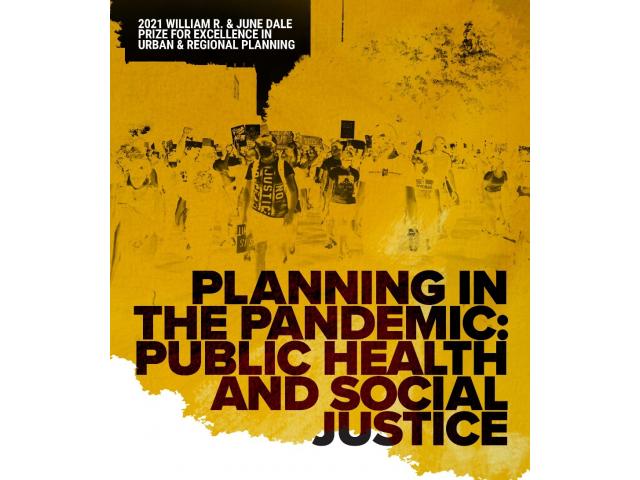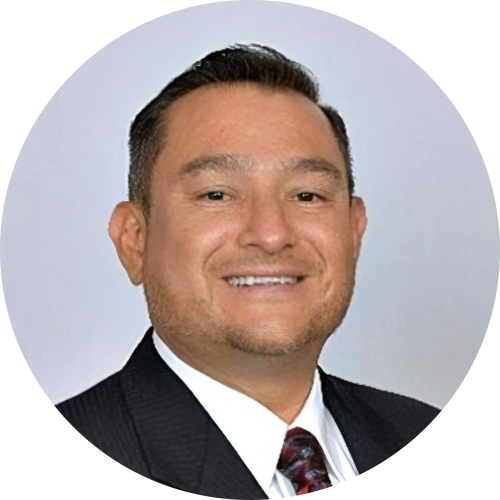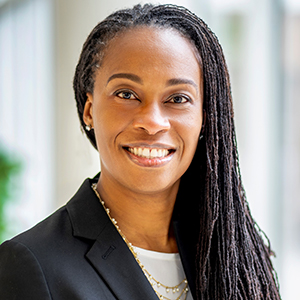2021 Dale Prize Planning In The Pandemic: Public Health and Social Justice
March 2, 2021
Press the tab key to view the content. Use the down arrow key to move to the next tab and up arrow key to move to the previous.

William R. And June Dale Prize for Excellence in Urban and Regional Planning
The Dale Prize recognizes planning excellence, creates dialogue between scholars and practitioners, and enriches the education of planning students. The Dale Prize is awarded in pairs: a $5,000 award to a scholar and a $5,000 award to a practitioner. Awardees will participate in a colloquium in which each winner presents their work in the field on the evening of March 2nd, 2021 and then spend two days, March 3rd and March 4th interacting with students in classes and through various events.
Because of the current pandemic, this year’s celebration will be completely online.
The 2021 theme is Planning in the Pandemic: Public Health and Social Justice
Urban Planning and Public Health have a long history of sharing theories and coordinating efforts to improve quality of life and population health. Some of the most seminal contributions of urban planning were in response to emerging public health threats during the rapid urbanization concomitant with industrialization. During the late 19th and early 20th century the collaboration between the two disciplines bore fruit as morbidity and mortality measures, along with other quality of life indicators, improved considerably in major urban areas throughout the world. The latter part of the 20th century was marked by a divergence of the disciplines as each sought to develop its own ambit both academically and practically.
The current pandemic, however, requires the two disciplines to once again forge their shared mantle, to join hands to ensure the health of all members of diverse communities and to enhance quality of life. The pandemic has laid bare many of the serious and dangerous inequalities in society. The elderly and those with underlying health conditions face the greatest morbidity and mortality risks. These health risk factors are, unfortunately, exacerbated by race, immigration and class as the greatest impact has been borne disproportionately by peoples of color and those at the lowest economic rungs.
The 2021 Dale Prize seeks to address these inequities by exploring how public health and urban planning can reinvigorate the traditional collaboration between planners and public health professionals. What can urban planners teach public health professionals about urban design, planning and policy? Similarly, what can public health professionals teach urban planners about assessing and improving health and quality of life? How can both disciplines coordinate their efforts to develop new frameworks and modes of action for improving public health and also reducing and eliminating systemic barriers that impose unequal burdens upon communities of color and the economically marginalized.
The Dale Prize seeks a scholar and a practitioner in planning, public health or a related area of expertise to explore these issues with the Urban and Regional Planning students and the rest of the Cal Poly community.
Dale Prize Awards Ceremony Agenda (AwardsCeremony.pdf)
The Department of Urban and Regional Planning at Cal Poly Pomona is pleased to announce the winners of the 2021 William R. and June Dale Prize for Excellence in Urban and Regional Planning. Dr. Nisha Botchwey of the Georgia Institute of Technology, has won the Scholar Prize. Mr. Miguel Angel Vazquez, AICP, of the Riverside University Health System-Public Health, has won the Practitioner Prize.
Practitioner Prize Winner
Mr. Miguel Angel VazquezAICP
Healthy Communities Urban Regional Planner Riverside University Health System – Public Health
 Miguel Angel Vazquez, AICP, has served planning and public health organizations in the private, public, and military sectors for nearly two decades. Throughout, he has championed environmental justice at different capacities ranging from organizing trash abatement community events to instigating environmental justice policy enactment. His current role at the Riverside University Health System-Public Health strengthens collaboration between the planning and public health professions and other non-traditional partners to improve health outcomes. Mr. Vazquez is a skillful professional and seasoned communicator who approaches his praxis as a servant leader.
Miguel Angel Vazquez, AICP, has served planning and public health organizations in the private, public, and military sectors for nearly two decades. Throughout, he has championed environmental justice at different capacities ranging from organizing trash abatement community events to instigating environmental justice policy enactment. His current role at the Riverside University Health System-Public Health strengthens collaboration between the planning and public health professions and other non-traditional partners to improve health outcomes. Mr. Vazquez is a skillful professional and seasoned communicator who approaches his praxis as a servant leader.
Mr. Vazquez is a prolific speaker, author, and organizer who works tirelessly to promote the values of healthy communities, inclusivity and justice. His significant publications and contributions include those pertaining to identifying the social determinants for health, promoting diversity in planning leadership, building a career road map, developing an equity policy guide for the APA, and the requirement to prepare Environmental Justice general plan elements. In 2020, Mr. Vazquez founded PHEAL, a unique initiative to bring planners and public health professionals together to build a more equity-based policy platform. Mr. Vazquez also helped to organize the inaugural conference of the Latinos and Planning Division of APA, the “Planning + Health in the Time of COVID-19” Webinar Series for Planners4Health, California, and the Planners4Health track at the APA California Chapter conference. Miguel has received well-earned distinction in the form of the 2020 California Chapter President’s Award for Distinguished Service and the 2018 National APA President’s Award.
Scholar Prize Winner
Dr. Nisha BotchweyPhD, MCRP, MPH
Associate Dean Academic Programs Georgia Tech Professional Education and Associate Professor, School of City and Regional Planning Director, Healthy Places Lab College of Design Georgia Tech
 Dr. Nisha Botchwey is the Associate Dean for Academic Programs, an associate professor of city and regional planning at the Georgia Institute of Technology, and an adjunct professor at Emory University's School of Public Health. An expert in health and the built environment as well as community engagement, she holds graduate degrees in both urban planning and public health. Dr. Botchwey's research focuses on health and the built environment, health equity, community engagement, and data dashboards for evidence-based planning and practice.
Dr. Nisha Botchwey is the Associate Dean for Academic Programs, an associate professor of city and regional planning at the Georgia Institute of Technology, and an adjunct professor at Emory University's School of Public Health. An expert in health and the built environment as well as community engagement, she holds graduate degrees in both urban planning and public health. Dr. Botchwey's research focuses on health and the built environment, health equity, community engagement, and data dashboards for evidence-based planning and practice.
Dr. Botchwey is a coauthor of Health Impact Assessment in the United States (Springer, 2014), convener of a national expert panel on interdisciplinary workforce training between the public health and community design fields, and author of numerous articles, scientific presentations, and workshops. Dr. Botchwey codirects the National Physical Activity Research Center, both the Atlanta Neighborhood Quality of Life and Health Dashboard and the data dashboard for Health, Environment, and Livability for Fulton County, and directs the Built Environment and Public Health Clearinghouse. She has won distinctions including a National Science Foundation ADVANCE Woman of Excellence Faculty Award, a Hesburgh Award Teaching Fellowship from Georgia Tech and the Georgia Power Professor of Excellence Award, a Rockefeller-Penn Fellowship from the University of Pennsylvania's School of Nursing, and was a Nominated Changemaker by the Obama White House's Council on Women and Girls.
Photo: Georgia Tech
Please join us for the Dale Prize 2021 events:
Dale Prize Colloquium: Tuesday, March 2, 2021
Virtual Event via Zoom, please register here.
Colloquium: 5:00pm - 7:00pm
Dale Prize Awards Ceremony:
Thursday, March 4, 2021 at 12:00pm - 1:00pm
For more information please contact Ms. Lydia Dolan at 909-869-2688 or urpdept@cpp.edu
The Department of Urban and Regional Planning at Cal Poly Pomona seeks nominations for the 2021 William R. and June Dale Prize for Excellence in Urban and Regional Planning. The Dale Prize recognizes planning excellence, creates dialogue between scholars and practitioners, and enriches the education of planning students. The Dale Prize is awarded in pairs: a $5,000 award to a scholar and a $5,000 award to a practitioner. Awardees spend two days meeting with students in classes and participate in a colloquium and other events. All meetings and events will be strictly online in 2021, following the CSU safety guidelines.
The 2021 theme is Planning in the Pandemic: Public Health and Social Justice
Urban Planning and Public Health have a long history of sharing theories and coordinating efforts to improve quality of life and population health. Some of the most seminal contributions of urban planning were in response to emerging public health threats during the rapid urbanization concomitant with industrialization. During the late 19th and early 20th century the collaboration between the two disciplines bore fruit as morbidity and mortality measures, along with other quality of life indicators, improved considerably in major urban areas throughout the world. The latter part of the 20th century was marked by a divergence of the disciplines as each sought to develop its own ambit both academically and practically.
The current pandemic, however, requires the two disciplines to once again forge their shared mantle, to join hands to ensure the health of all members of diverse communities and to enhance quality of life. The pandemic has laid bare many of the serious and dangerous inequalities in society. The elderly and those with underlying health conditions face the greatest morbidity and mortality risks. These health risk factors are, unfortunately, exacerbated by race, immigration and class as the greatest impact has been borne disproportionately by peoples of color and those at the lowest economic rungs.
The 2021 Dale Prize seeks to address these inequities by exploring how public health and urban planning can reinvigorate the traditional collaboration between planners and public health professionals. What can urban planners teach public health professionals about urban design, planning and policy? Similarly, what can public health professionals teach urban planners about assessing and improving health and quality of life? How can both disciplines coordinate their efforts to develop new frameworks and modes of action for improving public health and also reducing and eliminating systemic barriers that impose unequal burdens upon communities of color and the economically marginalized.
The Dale Prize seeks a scholar and a practitioner in planning, public health or a related area of expertise to explore these issues with the Urban and Regional Planning students and the rest of the Cal Poly community.
DATES: Tuesday evening, March 2, 2021, Wednesday, March 3 and Thursday, March 4, 2021.
Nominations Procedure
The prize winners will be selected based on:
- Evidence of substantial knowledge contribution to the field. This includes but is not limited to the quality and quantity of research, research/practice collaborations, impact on the field, and peer recognition.
- Applicability to the theme, Planning in the Pandemic: Public Health and Social Justice
- Potential for linking research results to planning theory (scholar).
- Potential for linking practice results to planning practice (practitioner)
Nomination packages should be submitted no later than Monday, December 7 2020. The package may be submitted in digital format by email or through a file sharing service. Self-nominations is accepted.
The package should include the following:
Nomination of Scholars
- Nominating Cover Letter
- Name and current affiliation and description of nominee’s contribution to the field
- Narrative justifying the nomination (3 page maximum)
- Nominee’s Curriculum Vitae
- Description and examples of research, publications and/or other contributions to the field. This can include links to internet sites where research or publications can be reviewed.
- Contact information for the nominator
- Contact information for the nominee
- Approval by nominee of the nomination, including a commitment to be available on-line for the full days of March 3-4, 2021.
Nomination of Practitioners
- Nominating Cover Letter
- Name and current affiliation and description of nominee’s contribution to the field
- Narrative justifying the nomination (3 page maximum)
- Resume/Curriculum Vitae/Portfolio
- Description and examples of projects, programs, experience and other contributions to the field. This can include links top internet sites where research or publications can be reviewed.
- Contact information for the nominator
- Contact information for the nominee
- Approval by nominee of the nomination, including a commitment to be available on-line for the full days of March 3-4, 2021.
Submittals should be electronically sent to:
Please put 2020 Dale Prize Nomination in the subject line.
OR
Invite Lydia Dolan (ledolan@cpp.edu) to Dropbox or other file sharing application.
Selection Schedule
Nomination Packages Due: December 7, 2020
Selection of Winners: December 2020
Events Honoring Winners: March 2 through March 4, 2021
Contact
If you have additional questions, please contact:
Dr. Gwen Urey
gurey@cpp.edu
(909) 869-2725